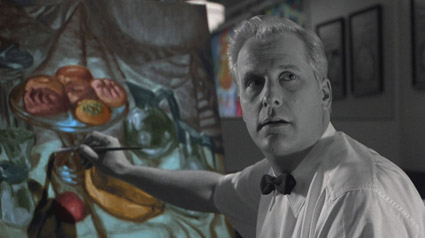As someone who has always had strong opinions, the command to love my enemies—namely those who hold different opinions or beliefs—has always been a challenge. I certainly know I am not alone! My parish recently invited James Martin, SJ to speak on his book Building A Bridge, which seeks a path for greater compassion, respect, and sensitivity between LGBT people and the institutional church. Martin’s message is first and foremost about extending love and worth, on both sides. But his visit has fuelled a backlash from some in the church with hateful, homophobic, and vile messages on social media. There is a great deal of unhealthy anger abounding. There is fear among these people that the Church is going to hell, that Martin, in speaking lovingly about LGBT people, is sending souls to hell. Without listening first to his message or engaging in dialogue, they expend enormous amounts of energy throwing stones and feeding their pain. And in seeing all this anger, I find myself beginning to feed on that and notice my own unhealthy anger.
 Freedom
Freedom
All of this conveys to me a certain lack of freedom. Freedom, in Ignatian terms, means a healthy detachment, a being “at a balance”. It doesn’t mean a lack of caring, but it denotes an implicit trust in God. With a nod to Julian of Norwich, freedom is thus a trusting in God that all will be well. An obsessive concern about the salvation of others or living in the fear that the world is going to shambles, indicates a lack of trust in God’s work, a God who abounds in mercy and love, who says not to be afraid. Richard Rohr says, “The Christian image of a torturous hell and God as a petty tyrant has not helped us to know, trust, or love God. God ends up being less loving than most people we know.”
The Law and Order God
Studies have shown that religions do well (i.e survive) historically when they have a punitive and punishing God. In other words, when religions stoke fear and God’s love is conditional, people are controlled and kept in line. This is the “law and order” God. It’s a hard image to change. It’s an image that creates a dualistic theology of us versus them. It’s about protesters and counter-protesters. It’s black and white. It’s heaven or hell. The people who throw theological and ideological stones often claim orthodoxy and Truth. But they fail to understand Truth as a mystery, instead seeing it as a list of divinely-ordained answers to our faithless questions. Pope Francis says, “When somebody has an answer for every question, it is a sign that they are not on the right road” (Gaudete et Exsultate).
Non-Coercive Love
True love of others, whether it’s a friend or an enemy, means allowing God to do the work and being free enough to let that person take their own path. Can we lovingly surrender others into God’s hands? This does not mean we have no role in God’s work. We are, after all, Christ’s hands and feet. But we are just one part of the body, not the whole body. We must ultimately surrender to the One fully in control. “Love trusts, it sets free,” says Francis. “It does not try to control, possess and dominate everything” (Amoris Laetitia). Those who utter vitriol around issues like homosexuality often claim that their motivation is out of love. “Hate the sin, love the sinner,” they say. Notice how “hate” is first? The underlying goal is convincing—forcing or controlling—the “sinner”, often by fear, into a “converted life”. This is not how love works. There is no freedom here. Anthony de Mello says, “The moment coercion or control or conflict enters, love dies.”
Even the people who speak hate I must love. And if I don’t, if I try to force them into my way of thinking, I fail at loving my enemies, I fail at truly trusting in God that all will be well.
“Salvation is not about what happens after we die, but what begins when we realize God loves us.”
– James Mulholland and Philip Gulley
Go deeper?
Listen to the podcast version of this post…









“Love trusts….it sets free…”
Thank you for this wonderful post. I’ve also experienced that feeding on other’s anger and hate, recognizing my own lack of freedom in that state. I pray that God helps me gain that freedom more & more, so I can be a more effective tool for Him!
Freedom: A great gift from God; but it has two edges. Our first parents had the freedom to choose. They picked the fruit of knowledge, that brought unending hunger for more of it; and also death. They rejected Life, the self-contained food; by tasting which one would hunger no more and leads to eternal life. The ultimate good of the gift of freedom is self-denial (detachment), which St Ignatius put to words in his prayer, “Lord, take all my liberty, my thoughts, memory and my will ……..”
I include myself in fueling this anger particularly over the recent political appointments in our government. So much so that reading any headline contrary to my belief fans the flame. Today I read 1000 free horses may end up in slaughter houses. I’m not a horse lover by any means but I appreciate creation. All I could think about was big money corporation taking over land for some sort of development disturbing nature instead of leaving it as it was intended. It is very difficult to be indifferent. It’s even harder for me to trust all will be well with the “storms” around me in my personal life. Yet in all this, I hear God calling me in subtle ways. Assuring me all is well.
Jesus, I trust in you….sometimes I don’t, but at this very moment, Jesus, I trust in you.
amor y oraciónes
ben
Dear Andy,
I am really thankful to you for this post. I listen to your Examen podcast every evening, and it helps me recognize God’s personal, caring and compassionate love.
And now, for this article, I am really thankful to you, because I myself belong to LGBT people, I am a transvestite. Beside this, I am a deep believer, have been living in marriage for 13 years and we have two daughters. Still, we have a huge cross in our marriage, a cross that has its weight on both of us.
It is really tough to come to terms that you have wishes belonging to the other gender. To experience the other gender’s clothes as the most natural on yourself. To experience as if there lived two people in you, a man and a woman.
Every day, I find relief in God’s compassionate love, to which your examen podcast adds a great deal.
Thank you for that,
Emily
Thank you.